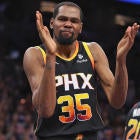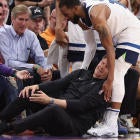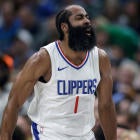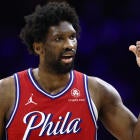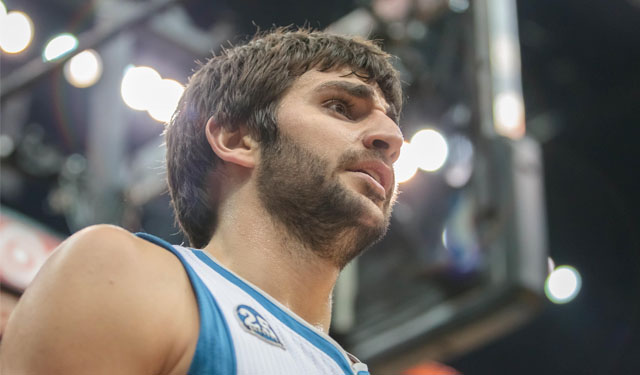
The Kevin Love trade to the Cleveland Cavaliers had the Minnesota Timberwolves hitting the "reset button" on their plan toward returning to the playoffs once again. Wolves fans know the tales of failure all too well. The last time the Wolves were in the playoffs was 2004 when they made the Western Conference finals. The last time they had a winning record was 2005. And now, they've got to figure out how to use their new assets and current key players to build toward ending these bad streaks that make their existence mostly futile.
With the Love deal out of the way and Andrew Wiggins looking like the future face of the franchise, the next thing for the Wolves to figure out is where they go with Ricky Rubio and his eligibility for a contract extension. Rubio was once supposed to be the face of the franchise. He was the prized get, a prodigy in the backcourt and a marketable force that could bring excitement back to the Wolves. And he was just that in his first season.
Heading into their game against the Lakers on March 9, 2012, Minnesota was tied with the Houston Rockets for the 8-seed in the West. They were 21-19 through their first 40 games of a 66-game campaign. Love was emerging as a superstar, Nikola Pekovic was establishing himself as a legitimate NBA center, and Rubio was the difference-maker between this team being scrappy and winning games. His defense and table setting were changing the way people talked about the Wolves. The Wolves weren't deep but they were surprisingly competent.
Then Rubio tore his ACL in the closing moments of a loss to the Lakers and the Wolves lost 19 of their final 24 games. He came back in mid-December of the next season in which Love missed 64 games with a twice-broken hand. Rubio worked his way back into shape by the end of the season, averaging 13.1 points, 8.6 assists, 4.9 rebounds and 2.7 steals in his final 40 games. But the Wolves were far too injured for him to have any impact, even at his best that season.
He had a rough start to the 2013-14 season. The summer of 2013 was the first summer in which Rubio truly did weight training, but it didn't help him finish better or improve a shake jump shot. The Wolves started out promising, but Rubio again started as a dreadful shooter, his Achilles' heel. Shots were clanging awkwardly off the iron. Over the first 31 games of the season, Rubio made only 34.5 percent of his shots and struggled to fit into a role that was now watching more playmaking going through Love's hands in the high post. People were noticing the historical inaccuracy in Rubio's shooting and his reputation was furthered as someone who couldn't hit a shot.
Whether it was a New Year's resolution or the tireless work with him and assistant David Adelman, Rubio managed to turn the corner a bit after Dec. 31. Over the final 51 games of the season, Rubio made 40.2 percent of his shots. From Jan. 1 through the end of the regular season, Rubio had a higher field goal percentage than Paul George (39.5 percent). He wasn't exactly shooting the ball like John Stockton, but he managed to crack and sustain the arbitrary 40 percent from the field standard so many had decided he needed to reach.
It's the "success" of being a borderline shotmaker over that large stretch, coupled with his unique numbers that make it so hard to peg what the Wolves should do with him if club and player cannot agree to a contract. Free agency and/or restricted free agency loom. What is Rubio worth on a basketball court? With the point guard market so saturated Eric Bledsoe struggled to find suitors in restricted free agency, what is reasonable and likely for Rubio to expect for his next contract?
The numbers are truly unique too. Rubio was one of two players in the NBA to average at least 9 points, 8 assists, 4 rebounds, and 2 steals in the 2013-14 season. Chris Paul was the other, except CP3 scored nearly 10 more ppg and he shot 8.6 percent better from the field. Rubio's certainly not on that value level. Rubio was also one of two players to play at least 2,600 minutes last season but shooting 38.1 percent or worse. Brandon Jennings was the other, and he just signed a three-year, $24 million deal last summer with the Pistons.
That isn't a salary Rubio and aggressive agent Dan Fegan are likely to accept. They've already started to leverage the loss of Love into getting Rubio the five-year max extension that was allegedly saved by David Kahn for the point man. The Wolves were simply worried about Love's long-term health and not waiting for Rubio's turn to come. As of late in the 2013-14 season, the Wolves front office didn't appear to be terribly interested in using the five-year max designation on Rubio. They know his improvement must come far before his payday does, and that improvement has to be vast to warrant such a salary increase.
The trade ends up working in the Wolves' favor too. It would be superb for an improving Rubio to mesh with the new young components of the Wolves. Rubio only turns 24 this October and pairing his passing and defensive abilities with the athleticism and potential of Andrew Wiggins, the athleticism of Zach LaVine, and whatever they can turn the quartet of Gorgui Dieng, Shabazz Muhammad, Anthony Bennett, and Thaddeus Young into could be the core needed to return to the playoffs. However, the Wolves have plenty of young assets to keep the fan base satiated and the point guard position is deep enough to move on to another option if the price to keep Rubio is too steep.
Rubio is one of the best passers in the NBA, he rebounds well for his position (and that was playing next to Love and Pekovic too), and he's one of the best defensive point guards in the league. His shooting and finishing ability improved last season, especially over the final 51 games. And he played all 82, healthy for a full season, something that has been rare in Minnesota for a few years.
There are plenty of reasons to bring Rubio back, but if he's going to demand more than what Stephen Curry got in his contract extension (four years, $44 million), the Wolves would probably be foolish to make that commitment. The Wolves hitting the "reset button" buys them time and flexibility in the way they build. It's hard to know what Rubio is worth because it's hard to quantify his impact on the floor. The Wolves are certainly better with him than without, and an improving ability to make shots with relatively acceptable accuracy would be a major plus for their future.
However, this is a new era for the Wolves and Flip Saunders doesn't have any need to keep Rubio as one of the faces of the franchise. It will be up to Rubio and his agent to figure out if he wants to still be a face next to the new phenoms in Minnesota or if he wants to brave the potentially frigid weather of being a restricted free agent at a saturated position. This could be a shot Rubio can't afford to miss.














